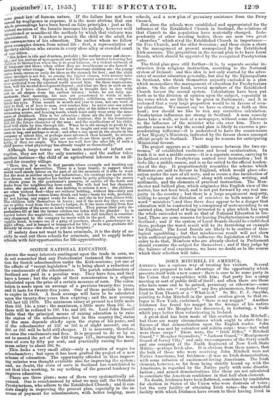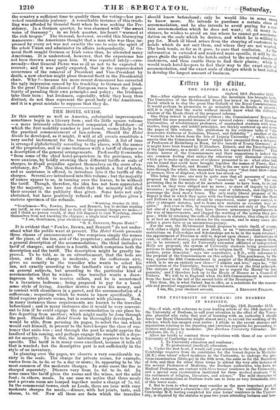JOHN MITCHELL IN AMERICA.
Anrenrea. has a curious way of treating her visitors. Several classes are prepared to take advantage of the opportunity which presents itself with a new corner: there is sure to be some party in the Union that sympathizes with him ; that party has a camp meeting or sort of public drill of itself ; and often there are those who have some end to be gained, pecuniary or otherwise—some Barnum who can " exploiter" any live phenomenon, from Jenny Lind to Tom Thumb or a "What-is-it." So Mr. P. J. Smythe, pointing to John Mitchell in the grand ovation given to that re- fugee in New York, exclaimed, "there is my nugget." Another Irishman has found his nugget in the wrongs of his native country ; and. Mr. Meagher has discovered, in lecturing, a trade which pays better than volunteering in Ireland.
A great deal has been made of this ovation to John Mitchell ; but there are many circumstances which ought to abate the in- fluence of that demonstration upon the English reader. John Mitchell was met by volunteer and militia corps: true—but what were those corps ? There were, the " Irish Rifles," "Mitchell Guard," " Meagher Grenadiers," "Jackson Guard," "Montgomery Guard of Jersey City," and only two companies of the Sixty-ninth and one company of the Ninth Regiment of New York State Militia—perhaps Irish also. It is obvious from these names, that the bulk of those who were receiving John Mitchell were not Native Americans, but Irishmen—it was an Irish demonstration, with some infusion of excitement-loving Americans. The Irish element, however, so far from being strictly bound up with the Americans, is regarded by the Native party with some dissatis- faction; and armed demonstrations like those are not calculated to conciliate the American confidence in that half alien element.
No doubt, Irishmen have been flattered, sometimes by candidates for election in States of the Union who were desirous of votes ; but the very facility of obtaining Irish votes—the wonderful facility with which Irishmen have sworn to their having lived in
the country a sufficient time to qualify them for voting—has pro- voked considerable jealousy. A remarkable instance of this truck- ling was afforded by General Scott when he was seeking the Pre- sidency. In a German quarter, he was charmed with "the sweet voice of Germany "; in an Irish quarter, his heart "warmed at the rich brogue." The General, however, overdid this blarneying manceuvre : the Americans thought that a man who was thus im- pressed by every set was not exactly the one to seize the spirit of the whole Union and administer its affairs independently. If Ge- neral Scott caught German or Irish votes thus, he alienated many Americans. It is understood, however, that the experience has not been thrown away upon him. It was reported lately--erro- neously—that General Pierce was so ill as not to be expected to recover; and it was partly expected, that in the unprecedented occurrence of the removal of President and Vice-President by death, a new election might place General Scott in the Presidential chair. Why P—because his more recent demeanour has corrected the ugly impression caused by his truckling to German and Irish. In the great Union all classes of European races have the oppor- tunity of parading their own principles and policy ; the Irishmen take their turn ; but Irishmen, especially, while they keep thus distinct, do not thus represent the great body of the Americans, and it is a great mistake to suppose that they do.



































 Previous page
Previous page